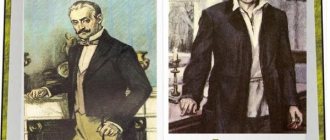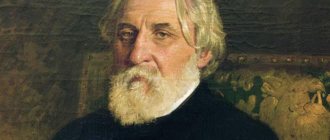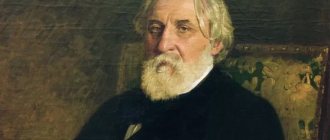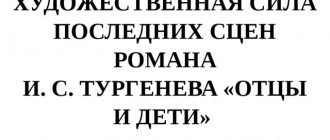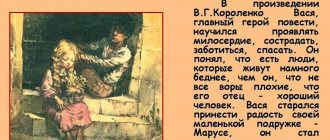- Essays
- Literature
- Turgenev
/
/
The main theme of the work is the conflict between two different generations, older and younger, which is an eternal world problem. The conflict develops in the story in one family, in which the younger generation is characterized by having its own values and principles, not wanting to exist under the influence of the older generation.
The main characters of the work are representatives of the younger generation represented by Bazarov and Kirsanov, as well as the latter’s father as a representative of the older generation.
Bazarov appears in the image of an awkward man, tall, thin face with a wide Socratic forehead, pointed predatory nose, round green eyes, red sideburns and thin lips.
The hero, presented in the image of Evgeny Bazarov, is a gloomy, detached man from the world, waging his own struggle, adhering to nihilistic views. He is a hardworking, intelligent, independent person, characterized as a strong personality who is alien to aristocratic principles and any subordination. Bazarov is a graduate of the medical faculty of a local university.
Arkady Kirsanov is presented as a positive hero, a pedant who tries to have a neat, impeccable appearance, who is a true aristocrat who does not strive for work.
Young people adhere to different principles in relation to the older generation, although they are friends, so Arkady takes his father’s side, supporting his point of view.
The older generation is represented by Arkady's father, Nikolai Petrovich Kirsanov, who is a nobleman living in his own estate, and his brother Pavel, a retired officer, for whom officer's duty and honor are above all. They are the complete opposite of Bazarov, with whom a conflict of generations occurs, also illustrated by the theme of the unrequited love of the protagonist, which determined the tragic ending of the work, since Bazarov, in the absence of mutual feelings, feels depression, leading to his death.
The theme of the conflict between the present century and the past century is demonstrated by the author through disputes and clashes between the main characters, who are characterized by extreme maximalism of their own beliefs, differing only in the desire of one for aristocracy, and the other for naturalism.
Reasoning 2
The book “Fathers and Sons” is the most outstanding creation of the famous writer I.S. Turgenev. The work is a real heartbreaking story about the life of the people. The writer showed the life and problems of ordinary people. The problems described in creation do not lose their relevance.
In the novel, the author wrote about the events that took place in 1859. It was in this year that the people of Russia experienced economic collapse. In addition to the crisis, the poet touched upon the problem of serfdom. In the novel, the author wanted to show hostility in the classes. For example, Nikolai Kirsanov did not know how to dominate ordinary peasants like Kirsanov the Elder. The serfs did not respect him at all and did not greet him accordingly. Previously, the peasants did not object to the landowners. The reason for the deterioration of the social situation was the beginning of the uprising of the people of the “third estate”. A striking example is Bazarov. The hero was born into the family of a simple doctor. Pavel Kirsanov considered him a “commoner.” On the master's estate, Evgeniy behaves cheekily and objects to the older generation and behaves defiantly.
In the novel, the author showed the differences between the younger and older generations. The main indicator of such a conflict is Pavel Petrovich. Kirsanov Sr. adheres to the old conservative judgment and looks at things from the objective side. Bazarov belongs to the younger generation who adheres to their principles. He does not recognize the established principles and authorities of that period. Evgeniy is engaged in scientific research and promotion of the philosophy of nihilism. His philosophy greatly irritated Pavel Kirsanov. After their first acquaintance, Kirsanov began to feel strong dislike for Evgeniy, and then hatred. The hero was irritated by everything, even Bazarov’s views on life. Thus, the author wanted to show that the country is not yet ready to resolve contradictions in society. The writer believed that the future depends on the younger generation.
In addition to economic and social, the author touched on the topic of love. There are no ideological disputes in love. It is impossible to predict anything in feelings. Bazarov considered love a mundane and primitive phenomenon. The hero could not control his feelings for Odintsova. Bazarov's theory collapses when he realizes that he is in love with Odintsova. His fleeting romance lasts for some time. Thus, the author described Bazarov as a dexterous, intelligent and cunning person who was focused on his principles. Arkady is the opposite of Bazarov. Despite his principles, Arkady was able to open his soul to love.
Essay on the topic: “Fathers” and “sons” in Turgenev’s novel “Fathers and Sons”
_________________________________________________________________________________________________ Composition. “Fathers” and “sons” in I. S. Turgenev’s novel “Fathers and Sons”
The problem of lack of mutual understanding between representatives of different generations is as old as the world. “Fathers” condemn, criticize and do not understand their own “children”. And they, in turn, try to defend their own positions at any cost, completely rejecting everything positive that was accumulated by the previous generation. This problem has been addressed to one degree or another by various writers. In my essay we will talk about Turgenev’s novel “Fathers and Sons” as one of the most striking “echoes” of the problem of “fathers and sons” that is still relevant today. Already in the title itself, the writer defined the main task of his work. Evgeny Bazarov is trying to defend his position in life. He wants to show that inexorable time leads to significant social changes. Therefore, the ideals, thoughts and aspirations that the previous generation lived by are already hopelessly outdated. The image of Evgeny Bazarov itself is interesting. The young man denies everything that does not seem personally necessary and interesting to him. This category includes poetry, music, and art. Bazarov can be condemned as much as he likes, but one cannot help but admit that his opinion also has a right to exist. Bazarov recognizes only what can be directly felt, roughly speaking, touched. Thus, Bazarov can rightfully be called a materialist. The image of Bazarov is a typical image of a commoner democrat. And Evgeniy has all the qualities characteristic of this group. Of course, he is very hardworking. Moreover, his materialistic view of the surrounding reality, combined with hard work, seems to be a highly positive quality. Bazarov is a realistic and practical person. These kinds of qualities are considered positive. So it cannot be denied that a generation of “children” can benefit society. Often the problem of “fathers and sons” is due to the fact that representatives of generations criticize and condemn each other’s actions and beliefs. The purpose of criticism is to prove the inconsistency and uselessness for society that are supposedly characteristic of the other generation. Thus, the “fathers” condemn the “children,” and the “children,” in turn, condemn the “fathers,” and the main accusation is the accusation of insolvency. However, these accusations are largely unfair, since representatives of both sides have qualities that can evoke, if not love and respect, then at least the sympathy of others (as well as the reader). The main character of the novel, Evgeny Bazarov, has amazing willpower, solid character, deep intelligence, and rare hard work. But at the same time, this image has many shortcomings. Moreover, Turgenev deliberately exaggerates, showing the negative sides of Bazarov, and in his person - the shortcomings of the generation of commoner democrats of the sixties. The disadvantages of the generation of “children” include demonstrative indifference to art, aesthetics, music and poetry. Also, the younger generation is not pleased with the indifference to the romance of human feelings and relationships, which includes love. There is a lot of rudeness and vulgarity in the behavior of Bazarov's imitators. Bazarov himself denies not only love, but also any sublime experiences and emotions of a person, including filial affection for parents. Such callousness cannot but cause protest, rejection and misunderstanding among the author and reader. And our attitude towards the generation of “children” would be sharply negative if we did not understand that behind their ostentatious indifference and cynicism hides an easily vulnerable and extremely sensitive nature; Bazarov criticizes much of what surrounds him. For example, he says that he does not understand the beauty of nature and is completely indifferent to it. However, an attentive reader cannot help but notice that Bazarov is interested in the world around him, nature, he is even able to admire the beauty of those phenomena that remain invisible to many. Among these “many” are representatives of the “fathers” generation, overly sensitive, self-absorbed and extremely selfish, from the point of view of both the “nihilists” themselves and the modern reader. In the novel, the image of the young nihilist Bazarov is contrasted with the image of a man of a completely different generation - Pavel Petrovich Kirsanov. Pavel Kirsanov is a true idealist; he is a typical representative of the liberal nobility. Once upon a time he was in love with a mysterious woman, Princess R. This love was his tragedy, it changed his whole life, took away all his strength and gave absolutely nothing in return. When Bazarov learns the story of Pavel Petrovich, he gives her his harsh description, “a man who put his whole life on the card of female love and, when this card was killed for him, became limp and sank to the point that he was not capable of anything, this kind of person - not a man, not a male...” Bazarov rejects romanticism and sentimentality, reducing everything to a materialistic understanding of life. That is why he expresses such an opinion about the fate of others. Pavel Petrovich literally from the very first meeting was imbued with antipathy towards Bazarov. Obviously, Pavel Petrovich intuitively felt that Bazarov was a worthy opponent. Bazarov's dispute with Pavel Petrovich Kirsanov is inevitable; the contradictions between them are revealed immediately and clearly. Bazarov argues with Pavel Petrovich about science, feelings, about the life of the people, about the problems of the development of society in general and the country in particular, and about much more. Bazarov personifies the generation of democrats, and Pavel Petrovich represents the generation of liberal nobility. Each generation has its own ideals, which they defend. Bazarov looks for expediency in everything. He says that “a decent chemist is twenty times more useful than any poet.” Naturally, such an opinion runs counter to Pavel Petrovich’s penchant for romance and sentimentality. Bazarov does not accept lies and pretense, he is sincere, and this is another difference between him and the generation of liberals, for whom pretense and posturing were something taken for granted. Not wanting to understand that the replacement of one order by another is natural and inevitable, Pavel Petrovich readily defends the old order, which is what Bazarov objects to. The disputes between Bazarov and Pavel Kirsanov clearly show that agreement and understanding between these representatives of different generations is simply impossible. The duel between Bazarov and Kirsanov is another proof of the impossibility of peaceful coexistence. The conflict between generations is acquiring global proportions. Of course, the older generation has many undoubted advantages. But time moves inexorably forward, and the last word remains with the “children.” The novel clearly shows the idea that in the dispute between Pavel Petrovich Kirsanov and Bazarov, the latter is the winner.
Essay 2
The entire work is based on problems in the relationship between the young and adult generations. This issue becomes more and more serious every year. The younger generation does not want to live as adults dictate. Young people want to learn everything on their own, and not act under the guidance of elders. Young people have their own values, understanding of life and principles.
The older generation is accustomed to telling young people how to live correctly. Adults stubbornly refuse to notice that children have grown up long ago and have their own opinions. This is an eternal confrontation. This has happened before. But in the modern world everything goes even further. Young people not only do not listen to their elders, but also ridicule their opinions and do not regard them as anything. Such a concept as respect goes away.
Often conflicts occur on domestic grounds. But things get complicated when they occur at the level of social and political views. In the work, an example of this is the young Bazarov with the nobleman Kirsanov. They are not related, but are in different age categories. Bazarov is a representative of the younger generation, and Kirsanov is the older one. In this case, we are witnessing a struggle between the nobility and the intelligentsia, built on democracy.
The issue of misunderstanding between generations is not limited to family or relatives, this problem extends to everyone. The older generation is conservative. It adheres to the old statutes. Unlike the younger generation, which is open to everything new and wants to move forward to new achievements and discoveries. We should not forget that young people have the right to live as they see fit, because it is their life.
Our opponents' arguments are based on politics, science, art and moral values. Bazarov denies feelings in all forms, in turn, he is focused on science. Absolutely sees no point in creativity and art. Kirsanov does not understand how art has deserved such an attitude towards itself, and enters into an argument with Evgeniy.
We must always remember that the younger generation has the right to explore the world on their own, through their own mistakes and trials. The older generation forgot that they were also young. And it also had its own ambitions and understandings.
Other topics: ← Based on the story of Mumu↑ Turgenev Does Russia need Bazarov? →
`
Subject
The novel “Fathers and Sons” reveals global issues. First of all, this is the interaction between fathers and children (this can be understood both directly and conditionally, since fathers and children are understood not only as family members, but also as representatives of different generations).
The meaning of the novel is not only to show misunderstanding in family relationships, but also to display the conflict between the progressive thinking of the new generation and the established views of the old generation.
In the 1850s, the inhabitants of Russia were still divided into nobles (the advanced class), ordinary people (free, but without noble status and the privileges that came with it), and peasants (not yet freed at that time). Those who had a high position in society and were considered intelligentsia did not want to change anything. It turned out that among all Russian residents, it was the nobles who were of greatest value. This is precisely what Turgenev criticized in his work: the idle life of the nobility did not help society to develop.
The representatives of this class themselves did not want to change anything and preferred to live in the world familiar to them. The younger generation (especially those who did not have wealth and an aristocratic lifestyle) began to feel that the existing system was outdated and of no practical use. And so it was. But only such a movement as nihilism denied all existing values, but, as Pavel Petrovich rightly noted, did not offer anything in return. It turned out that Bazarov denied everything... just for the sake of denying.
The main idea of the book is to create for the reader a serious choice in several issues at once:
- What is needed for the stable development of society?
- How overrated is nobility?
- What ideas should progressive youth be guided by?
- Does adherence to old traditions have a right to exist?
In our time, nobles and peasants have long ceased to exist, but questions of choice and progress always remain relevant. Likewise, generational conflict will never become obsolete.
Popular writings
- An essay based on the painting Herring by Petrov-Vodkin.
Paintings by Petrov-Vodkin have never been distinguished by a variety of details. However, despite this, they are quite expressive and are able to attract the eye from the very first fleeting glance. - My younger sister - essay
Since childhood, I loved playing with dolls and envied those who had sisters or brothers. Of course, why need any toys when there is a real little man. I wanted a sister so bad - A woman at war - essay
Today's reality is such that it is not so easy to imagine all the possible and impossible horrors of the war years. War is the most terrible, terrible and undesirable event that can happen at the state level
